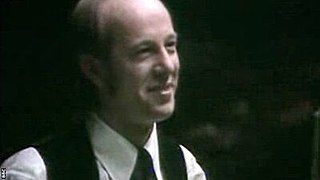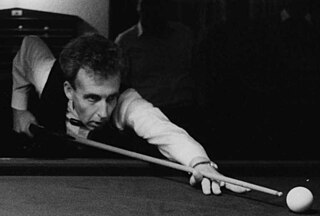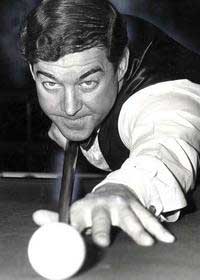
Snooker is a cue sport played on a rectangular billiards table covered with a green cloth called baize, with six pockets: one at each corner and one in the middle of each long side. First played by British Army officers stationed in India in the second half of the 19th century, the game is played with twenty-two balls, comprising a white cue ball, fifteen red balls and six other balls—a yellow, green, brown, blue, pink and black—collectively called 'the colours'. Using a snooker cue, the individual players or teams take turns to strike the cue ball to pot other balls in a predefined sequence, accumulating points for each successful pot and for each foul committed by the opposing player or team. An individual frame of snooker is won by the player who has scored the most points, and a snooker match ends when a player wins a predetermined number of frames.

Alexander Gordon Higgins was a Northern Irish professional snooker player and a two-time world champion who is remembered as one of the most iconic figures in the sport's history. Nicknamed "Hurricane Higgins" for his rapid play, and known as the "People's Champion" for his popularity and charisma, he is often credited as a key factor in snooker's success as a mainstream televised sport in the 1980s.

Steve Davis is an English retired professional snooker player who is currently a commentator, DJ, electronic musician and author. He is best known for dominating professional snooker during the 1980s, when he reached eight World Snooker Championship finals in nine years, winning six world titles, and held the world number one ranking for seven consecutive seasons. He was runner-up to Dennis Taylor in one of snooker's most famous matches, the 1985 World Championship final, which ended in a dramatic black-ball conclusion that attracted 18.5 million viewers, still the largest British television audience for any broadcast after midnight and any broadcast on BBC Two.

Graham Miles was an English snooker player.
Anthony Christian Meo is a retired English snooker player. He won the 1989 British Open by defeating Dean Reynolds 13–6 in the final, and was runner-up to Steve Davis at the 1984 Classic. He won four World Doubles Championship titles, partnering Davis, and the 1983 World Team Classic representing England alongside Davis and Tony Knowles.

Terence Martin Griffiths is a Welsh retired professional snooker player and current coach and pundit. After winning several amateur titles, including the Welsh Amateur Championship in 1975 and back-to-back English Amateur Championships in 1977 and 1978, Griffiths turned professional in June 1978 at the age of 30. In his second professional tournament, he qualified for the 1979 World Snooker Championship. He reached the final of the event where he defeated Dennis Taylor by 24 frames to 16. This was only the second time a qualifier had won the World Snooker Championship, after Alex Higgins in 1972; only Shaun Murphy in 2005 has since emulated the achievement. In 1988, Griffiths again reached the final of the competition. He was tied with Steve Davis, 8–8, but lost the match 11–18.

Clifford Charles Devlin Thorburn is a Canadian retired professional snooker player. Nicknamed "The Grinder" because of his slow, determined style of play, he won the World Snooker Championship in 1980, defeating Alex Higgins 18–16 in the final. He is generally recognised as the sport's first world champion from outside the United Kingdom—since Australian Horace Lindrum's 1952 title is usually disregarded—and he remains the only world champion from the Americas. He was runner-up in two other world championships, losing 21–25 to John Spencer in the 1977 final and 6–18 to Steve Davis in the 1983 final. At the 1983 tournament, Thorburn became the first player to make a maximum break in a World Championship match, achieving the feat in his second-round encounter with Terry Griffiths.

Doug Mountjoy was a Welsh snooker player from Tir-y-Berth, Gelligaer, Wales. He was a member of the professional snooker circuit from the late 1970s and throughout the 1980s, and remained within the top 16 of the world rankings for 11 consecutive years. He began his professional snooker career by taking the 1977 Masters, which he entered as a reserve player. He won both the 1978 UK Championship and the 1979 Irish Masters. Mountjoy reached the final of the 1981 World Snooker Championship where he was defeated by Steve Davis. He was also runner-up at the 1985 Masters losing to Cliff Thorburn, but by 1988 he had dropped out of the top 16.
William Joseph Thorne was an English professional snooker player. He won one ranking title, the 1985 Classic. He also reached the final of the 1985 UK Championship, losing 16–14 to Steve Davis after leading 13–8. He was noted for his break-building, and was among the first players to compile 100 century breaks. He earned the nickname "Mr Maximum". After retiring as a player, Thorne became a snooker commentator, primarily for the BBC.

Edward FrancisCharlton, was an Australian professional snooker and English billiards player.* He remains the only player to have been world championship runner-up in both snooker and billiards without winning either title. He later became a successful marketer of sporting goods launching a popular brand of billiard room equipment bearing his name.

David Taylor is an English former professional snooker player. He won the World and English Amateur Championships in 1968, before the success of those wins encouraged him to turn professional. He was nicknamed "The Silver Fox" because of his prematurely grey hair.
Kirk Stevens is a Canadian former professional snooker player.

The World Professional Billiards and Snooker Association (WPBSA), the governing body for professional snooker, first published official world rankings for players on the main tour for the 1976–77 season. Before this, for each tournament the defending champion was seeded first, and the previous year's runner-up second.
Mike Hallett is an English former professional snooker player and commentator. He won the 1989 Hong Kong Open.
Anthony Knowles is an English former professional snooker player. He won the 1982 International Open and the 1983 Professional Players Tournament, and was a three times semi-finalist in the World Professional Snooker Championship in the 1980s. His highest world ranking was second, in the 1984/85 season.
Dean Reynolds is an English former professional snooker player whose career spanned twenty years from 1981 to 2001.
Clive Harold Everton was a sports commentator, journalist, author and professional snooker and English billiards player. He founded Snooker Scene magazine, which was first published in 1971, and continued as editor until September 2022. He authored over twenty books about cue sports from 1972 onwards.
Ray Edmonds is a former English professional player of English billiards and snooker. He twice won the World Amateur Snooker title, and won the World Professional Billiards Championship in 1985.
The 1981 World Snooker Championship was a ranking professional snooker tournament which took place from 7 April to 20 April 1981 at the Crucible Theatre in Sheffield, England. The tournament was the 1981 edition of the World Snooker Championship, and was the fifth consecutive world championship to take place at the Crucible Theatre since 1977. It was sanctioned by the World Professional Billiards and Snooker Association. The total prize fund for the tournament was £75,000, of which £20,000 went to the winner.
The 1981–82 snooker season was a series of snooker tournaments played between 25 June 1981 and 29 May 1982. The following table outlines the results for ranking events and the invitational events.









